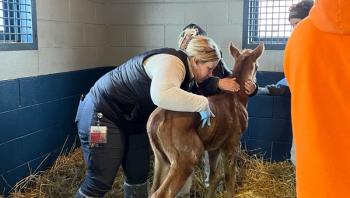
Case 7
The resting cortisol concentration is a great way to rule OUT Addison's disease. If the resting cortisol concentration is > 2 µg/dl, then the patient is not likely to be addisonian. It is not, however, a test that can be used to diagnose Addison's disease because a single cortisol concentration can be low even in a normal dog. In cases with a resting cortisol < 2 µg/dl, you must perform an ACTH stimulation test to confirm the disease.
Fortunately Roscoe's owners are willing to do further testing, and they come back the following day for the ACTH stimulation test. Here are his results:
Resting cortisol: < 1 µg/dl
Cortisol 1 hour post-ACTH administration: < 1 µg/dl
So it looks like Roscoe has what is referred to as atypical Addison's disease. Atypical means that he appears to be solely glucocorticoid-deficient and not mineralocorticoid-deficient since his electrolyte concentrations are normal. Patients with glucocorticoid-deficient Addison's disease can be trickier to identify because they don't have the classic electrolyte derangements such as hyponatremia, hypochloremia, and hyperkalemia. This type of hypoadrenocorticism may develop because of primary pituitary disease that results in a decrease in ACTH production or because of adrenal disease that results in destruction of the zona fasciculata and reticularis. Because ACTH has minimal impact on mineralocorticoid release, dogs with atypical Addison's due to low ACTH production may never develop the electrolyte abnormalities of hypoadrenocorticism, whereas those with primary adrenal disease may progress to become mineralocorticoid-deficient. It may be possible to predict this by measuring an endogenous ACTH concentration once atypical Addison's is diagnosed. Otherwise, routine monitoring and close observation by the owners will be important because when or if these patients will become mineralocorticoid-deficient is hard to predict.
You send Roscoe home on a physiologic dose of prednisone (0.25 mg /kg/day) and tell the owners to monitor for decreased activity, vomiting, diarrhea, or loss of appetite. If any of these signs are noted, they are to give him a double dose of prednisone. If Roscoe doesn't seem to improve within a few days, then he should be reevaluated. Otherwise he should come back in two weeks for a recheck visit to reevaluate his CBC.
<<
Newsletter
From exam room tips to practice management insights, get trusted veterinary news delivered straight to your inbox—subscribe to dvm360.




